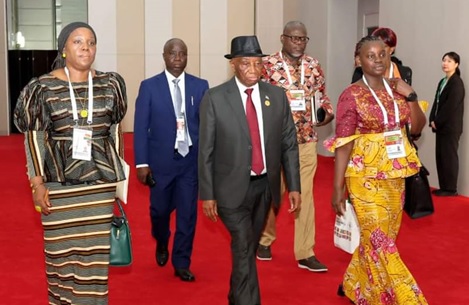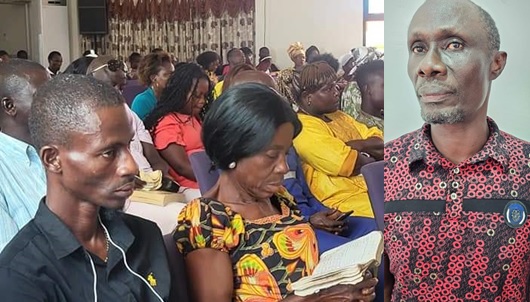MONROVIA – President Joseph Boakai has returned to Liberia after a weeklong visit to Seoul, South Korea. Invited by President Yoon Suk Yeol, President Boakai attended the inaugural Korea-Africa Summit held from June 4-5, 2024. Despite his efforts, President Boakai is facing significant criticism from his opponents and the public.
Critics argue that while other countries secured substantial investments, President Boakai returned with little more than photos from a memorandum of understanding (MOU) signing ceremony. For example, Ghana secured $200 million from South Korea, highlighting a stark contrast with Liberia’s more modest achievements.
Randell Massaquoi Dobayou II was particularly vocal in his critique, stating, “Mr. Joe and his weak team strive to prove a point for their useless trip to South Korea. They are here shamelessly parading and chest-beating with an ordinary Joint Resolution. This joint resolution is merely a vague expression of collective intent by all who attended; this lacks concrete substance and tangible outcomes.”
Dobayou emphasized the need for specific, measurable, and verifiable outcomes from such summits. He contrasted Liberia’s results with those of other nations that secured binding MOUs and investments, expressing disappointment in what he saw as a missed opportunity for Liberia.
Adding to the criticism, opposition leaders have questioned the effectiveness of President Boakai’s international engagements, arguing that they fail to bring meaningful benefits to the Liberian people. They accuse the administration of focusing more on appearances than on substantive progress.
In response, an Executive Mansion release dated June 8, 2024, detailed President Boakai’s activities in Korea. The summit brought together African Heads of State, high-level business leaders, and Korean government officials. President Boakai participated in a business summit on Liberia, attended a reception hosted by President Yeol, addressed the plenary of the Korea-Africa Summit, and held bilateral and business meetings.
The Executive Mansion highlighted that President Boakai also engaged with the Liberian community in Korea, reaffirming his commitment to rebuilding Liberia. This engagement was seen as an effort to boost morale and maintain support among the diaspora.
The trip concluded with another business forum, resulting in the signing of several MOUs focused on agriculture, infrastructure, energy, and water. The administration insists these agreements will pave the way for future investments and development projects in Liberia.
President Boakai expressed gratitude to President Yeol, the Korean government, and the business community for their support during the visit. He emphasized his commitment to continued engagement and follow-ups, hoping to turn these initial agreements into tangible benefits for Liberia.
Despite these assurances, critics remain skeptical. They point out that previous agreements have often failed to materialize into real benefits, and they fear this trip might be no different. The pressure is on President Boakai to prove that his administration can deliver on its promises.
Supporters of President Boakai argue that these criticisms are politically motivated. They believe that the President’s efforts to strengthen international ties and attract investments should be given time to yield results. They accuse the opposition of undermining national interests for political gain.
This controversy comes at a time when Liberia is in dire need of foreign investments to boost its economy. The country faces significant challenges, including high unemployment, poor infrastructure, and a struggling healthcare system. The outcome of President Boakai’s efforts could have a profound impact on the nation’s future.
The President’s administration is now tasked with the difficult job of turning potential investments into reality. This will require not only maintaining strong international relationships but also ensuring transparency and accountability in how these investments are managed.
As the debate continues, the Liberian people await tangible improvements in their daily lives. The success or failure of President Boakai’s initiatives will likely be a key factor in the upcoming elections, influencing voters’ confidence in his leadership.
President Boakai’s return from South Korea has sparked a heated debate about the effectiveness of his administration’s international strategy. While he remains optimistic about the potential benefits, his critics demand more concrete results. The coming months will be crucial in determining whether these efforts will translate into meaningful progress for Liberia.







